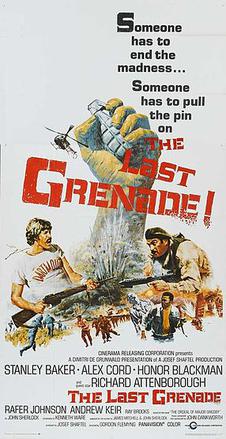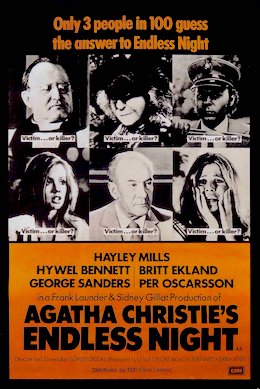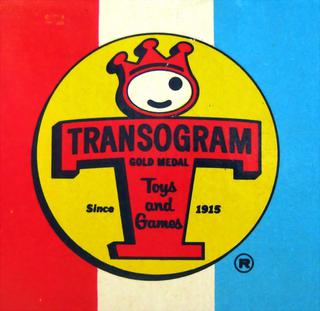Related Research Articles

David Essex is an English singer-songwriter and actor. From 1973 to 1994, he attained 19 Top 40 singles in the UK and 16 Top 40 albums. Internationally, Essex had the most success with his 1973 single "Rock On". He has also had an extensive career as an actor.

Nigel Dennis Patrick Wemyss-Gorman was an English actor and stage director born into a theatrical family.
Hemdale Film Corporation was an independent American-British film production company and distributor. The company was founded in London in 1967 as the Hemdale Company by actor David Hemmings and John Daly, naming the company from a combination of their surnames. The company produced numerous acclaimed films, often in conjunction with companies such as TriStar and Orion Pictures, including The Terminator (1984), Platoon (1986) and The Last Emperor (1987), the latter two being back-to-back winners of the Academy Award for Best Picture.

Perfect Friday is a 1970 British bank heist film directed by Peter Hall and starring Ursula Andress, Stanley Baker, David Warner and T. P. McKenna. It was written by Scott Forbes and Anthony Greville-Bell. An audacious plan to rob a bank leads to double-cross.
Samuel Bronston was a Bessarabian-born American film producer and media executive. His films have earned a total of seven Academy Award nominations.

The Go-Between is a 1971 British historical drama film directed by Joseph Losey. Its screenplay by Harold Pinter is an adaptation of the 1953 novel The Go-Between by L. P. Hartley. The film stars Julie Christie, Alan Bates, Margaret Leighton, Michael Redgrave and Dominic Guard. It won the Palme d'Or at the 1971 Cannes Film Festival.
Jack Olsen was an American journalist and author known for his crime reporting.

Shalako is a 1968 Western film directed by Edward Dmytryk and starring Sean Connery and Brigitte Bardot. It was shot at Shepperton Studios near London with sets designed by the art director Herbert Smith. Location shooting took place in Almería in southern Spain, particularly in the Tabernas Desert which was frequently used in European westerns during the decade.

Gordon William Flemyng was a Scottish television and film director. He was also a writer and producer. He directed six theatrical features, several television films and numerous episodes of television series, some of which he also wrote and produced.

Caravan to Vaccarès is a novel by author Alistair MacLean, originally published in 1970. This novel is set in the Provence region of southern France. The novel was originally written as a screenplay for producer Elliot Kastner.
James Ruffin Webb was an American screenwriter. He was best known for writing the screenplay for the film How the West Was Won (1962), which garnered widespread critical acclaim and earned him an Academy Award.

The Last Grenade is a 1970 British war film directed by Gordon Flemyng and starring Stanley Baker and Alex Cord as two soldiers of fortune, formerly comrades, who now find themselves on opposite sides. The cast also includes Richard Attenborough, Honor Blackman, Rafer Johnson, John Thaw, Andrew Keir, and Julian Glover. It was the final feature film directed by Flemyng.

The Virgin and the Gypsy is a 1970 British drama film directed by Christopher Miles and starring Joanna Shimkus and Franco Nero. The screenplay by Alan Plater was based on the novella of the same name by D. H. Lawrence. The film was voted "Best Film of the Year" by both the UK and USA critics.

Christopher Miles was a British film director, producer and screenwriter.

Up Pompeii is a 1971 British sex comedy film directed by Bob Kellett and starring Frankie Howerd and Michael Hordern. It was written by Sid Colin based on an idea by Talbot Rothwell.

Endless Night is a 1972 British horror-mystery film directed by Sidney Gilliat and starring Hayley Mills, Britt Ekland, Per Oscarsson, Hywel Bennett, and George Sanders. Based on the 1967 novel Endless Night by Agatha Christie, the plot follows a newlywed couple who feel threatened after building their dream home on cursed land.
Kenneth Harper (1913–1998) was an English film producer. He produced 13 films between 1954 and 1973. He was a member of the jury at the 21st Berlin International Film Festival.

A Time for Loving is from an original screenplay by the French playwright Jean Anouilh, commissioned by the producer Anatole de Grunwald before he died in 1967, which was finally produced by his younger brother Dimitri de Grunwald with Christopher Miles directing in 1970. It is a bitter-sweet nostalgic look at Paris just before and during the second World War as seen by three couples, who over the years rent the same artist's studio in Montmartre.
Dimitri de Grunwald was a Russian-born British film producer, and the brother of producer Anatole de Grunwald.

Transogram was an American producer of toys, games and other leisure products from the early 20th century to 1971. It is best known for such long-produced games as Tiddledy Winks and Game of India, as well as such baby-boomer favorites as Green Ghost and television tie-in board games for such characters and series as Atom Ant, The Flintstones, Gomer Pyle, U.S.M.C., Perry Mason and Tom and Jerry.
References
- 1 2 3 Louise Sweeney (1 December 1969). "A way out of films' financial quicksand?: Global co-op plans for Anouilh, Huxley, Lawrence Jean Anoul". The Christian Science Monitor. p. 16.
- ↑ LEONARD SLOANE (12 July 1970). "Spotlight:: Financing The Films: New Ideas". New York Times. p. 100.
- ↑ "FOUR STAR OFFICER DENIES ANY TAKEOVER". Los Angeles Times. 21 November 1969. p. d17.
- ↑ THOMAS J. BRAY (23 November 1970). "From Riches to Rags: Du Pont Heir's Dealings To Acquire Transogram Hastened His Downfall Costly Deal Put a Big Strain On His Finances, but Firm May Benefit in Long Run More Dollars for Mr. Shaheen From Riches to Rags: Du Pont Heir's Dealings to Buy Transogram Co. Hastened His Financial Downfall". Wall Street Journal. p. 1.
- ↑ "No. 46720". The London Gazette . 27 October 1975. p. 13530.
- ↑ A. H. WEILER. (27 October 1968). "Fellini Meets Bergman". New York Times. p. D15.
- ↑ Martin, Betty. (30 October 1968). "Miss Moore in 'Habit' Role". Los Angeles Times. p. i11.